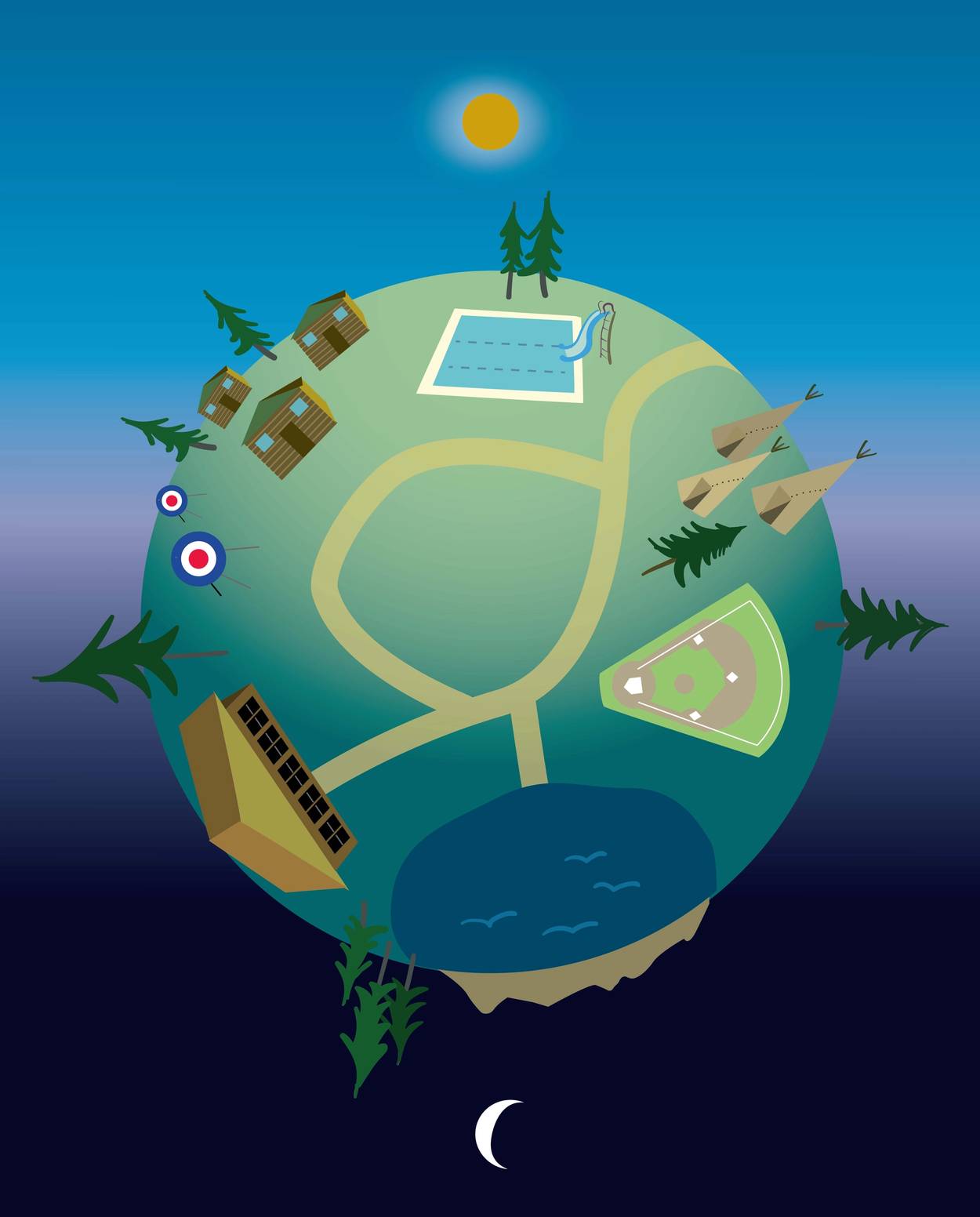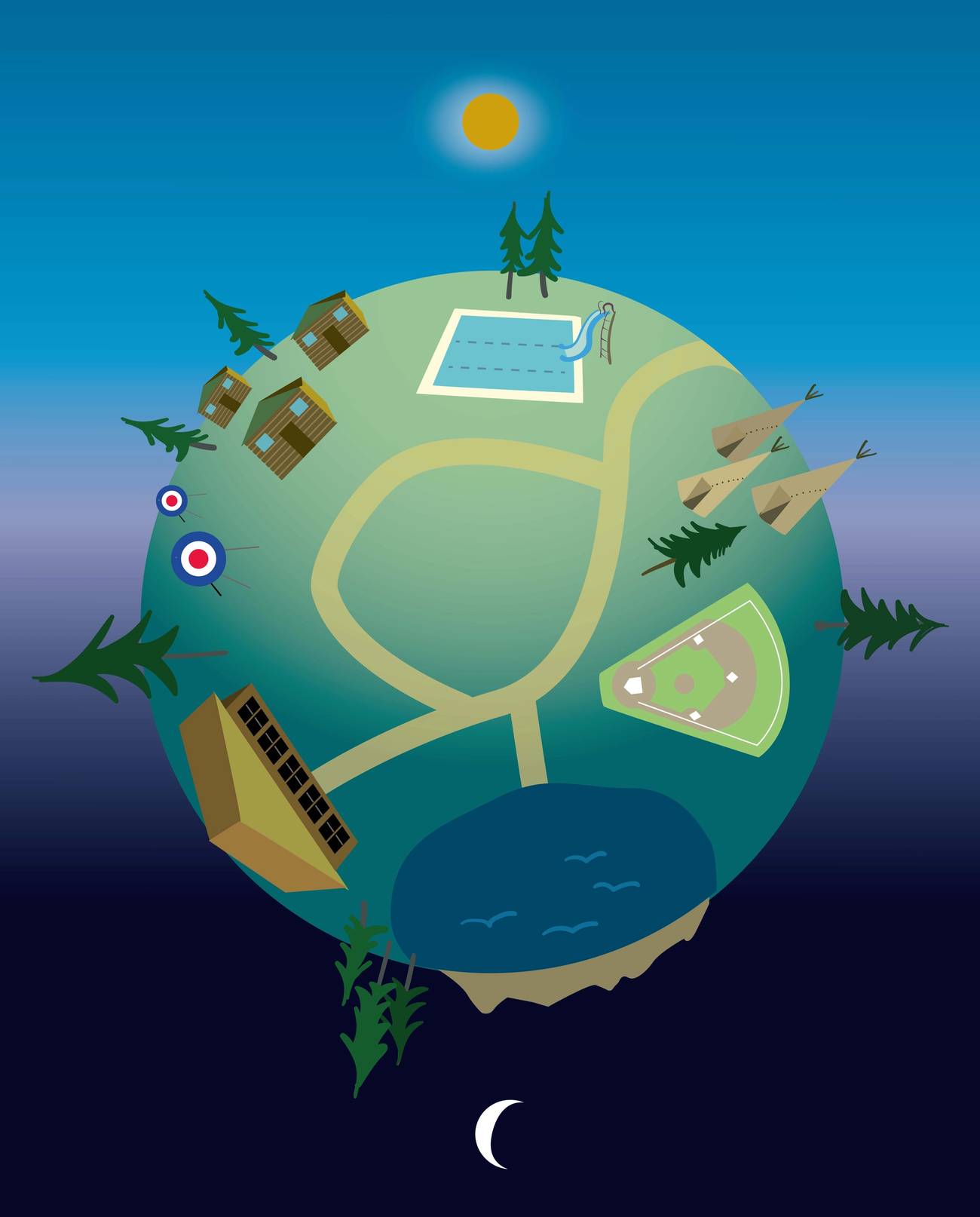A Place of One’s Own
Summer camp isn’t only about friends and songs and Jewish identity. It’s also about connection to a physical space.




My dad turned onto a gravel path from a backcountry road. Trees pressed up to either side of my family’s car as it joined a caravan of others, all parked one behind the other. Kids abounded, running to see and hug old friends. Parents stayed close to their vehicles, chatting with those nearby.
Eventually, the kids returned to their parents with news that the first cars had moved through the gate. Young and old returned to their cars and the caravan lurched, inchwormlike, into the camp. And before me—a shy 11-year-old equal parts anxious and eager for the adventure—the grounds unfolded, trees giving way to a field surrounded by woods, a climbing wall at one corner. I got my first look at my new summer home.
COVID-19 robbed countless Jewish children across the country from a similar moment this summer.
That’s tragic on many levels because Jewish overnight camp works well in a number of ways. It gives kids an identity by bringing young Jews into a relationship with their tradition. At the same time, it creates space for children to form lifelong friendships, feel a sense of belonging, and develop “soft” life skills like leading a group of peers or mending a friendship after an argument. But from my years at camp, I realize Jewish overnight-camp boosters often overlook one key aspect of its power: the physical camp itself.
Kids who were planning to spend their first weeks at camp this summer will miss their first taste of deep connection to a few hundred acres somewhere in the woods. It’s an important year they will never get back. Zoom calls or small group, socially distant meetups with would-be bunkmates are poor substitutes.
Because for me, so many formative experiences I had at the same place over many years shaped my identity—my Jewish values, sense of self, and sense of community. These experiences were so powerful—and so specifically associated with one place—that the woods, lake, paths, and buildings of camp left a large mark on my identity in their own right. I suspect I’m not the only one.
For nearly a decade, Jewish leaders concerned about “the next generation” have had quantitative evidence for anecdotal assumptions that overnight camp promotes Jewish communal and ritual engagement. In 2011, the Foundation for Jewish Camp published a report led by sociologist Stephen M. Cohen on the difference in Jewish practice and attitudes among adults who grew up attending camp and adults who did not. Looking at data from 26 Jewish population surveys, Cohen and his team controlled for other factors like home observance and determined that campers were 45% likelier to attend synagogue once a month or more, 37% likelier to light Shabbat candles, 21% likelier to feel that being Jewish is very important, and even 10% likelier to have married a fellow Jew.
So campers gain a Jewish identity as well as everything that any secular camp could give them: the friendships, the independence, the new skills and hobbies. But for me, the geography amplified all those identity-builders and imbued them with extra meaning.
After that first season, I returned to Camp Yavneh in Northwood, New Hampshire, for the next 10 summers. Because I arrived at camp as a prepubescent and left as I began my final year in college, each location in camp holds memories from different life stages. Bunkmates and counselors came and went. I gained new friends and drifted apart from old ones. Eventually, after a few years on staff, most of my friends were gone. The only constants were the buildings, the paths through the trees, the lake, and the property as a whole.
Take the chadar ochel (dining hall), a place no one at Yavneh probably thinks of much. It’s a utilitarian building meant to house and feed hundreds of people at once. But so much happened to me there. It’s where I had small firsts, like singing karaoke for the first time (the Beatles’ “Can’t Buy Me Love”) or busing a table for messy fifth graders. More significantly, it’s where I joined hundreds for rousing, boisterous Shabbat evening zemirot in a crowded “dance floor” and bittersweet, equally rousing songs for seudah shelishit, sang as the sun turned the sky outside the windows a light purple tinged with a little orange.
Sometimes as a counselor I would walk into the chadar ochel late at night to get a cup of tea, the room dark except for the emergency exit lights. If I was alone, it was easy to lapse into fond memories for all the people and places that room held. If I was with a friend, we may have looked up at the plaques on the wall that memorialize past maccabiah teams with beautiful paintings.
What goes on inside the chadar ochel transforms it into a beautiful building, even if it is spartan. Going into that building day in and day out to do so much more than eat made me attached to it. Eventually, a simple dining room became a symbol to me for what it means to be a part of a tightknit community that has a collective memory and experience.
Perhaps what I am feeling is “place identity.” First introduced in the 1970s by environmental psychologists, place identity describes a phenomenon by which an individual’s sense of self includes a specific geography—a home, a city, even a whole island. Later theorists extended this concept to include other people. Place becomes a self-identifying factor for an individual when that place sets the stage for communal events and rites of passage.
Spanish psychologist Bernardo Hernández distinguishes place identity from another psychological concept, place attachment. “Place attachment is an affective-emotional bond with residence places, whereas place identity is a cognitive mechanism, a component of self-concept and/or of personal identity in relation to the place one belongs to.” While Hernandez speaks about place identity and attachment in the context of environmental protection, it can apply equally to Jewish camping. In my first years at Yavneh, I developed an emotional bond with the camp. After a decade, the bond became a key factor in how I perceived myself, even when I was stuck at home in the winter months.
Unlike the chadar ochel, many people at Yavneh cite the agam (lake) as their favorite place at camp. It’s kind of idyllic. A small beach seemingly cut out of the woods leads into still-as-glass, dark water surrounded on all sides by tall trees with rich green leaves. Whenever I arrived at this peaceful corner of camp, it felt like I could be at peace too, no matter the weather. Whether I was lifeguarding under a baking sun, or watching from the beach as a gray cloud pelted rain onto the water, this was the place at camp where I felt most with nature. One summer in particular, when I would sometimes be alone at the beach on rainy afternoons, I’d spot the same blue heron alight on the dock at the same time every day. Pure bliss.
Of course, the agam also hosts human, social connections. As a young camper, I enjoyed splashing and snorkeling with bunkmates. As I got older, there were early morning swims across the lake to another clearing, hours spent on boats in the center of the water talking about anything and everything, and a stolen moment with a first girlfriend on a kayak in a small alcove of water hidden by the trees.
When I returned to the agam as a counselor, or during an alumni weekend, I couldn’t help but see those things repeating themselves again and again, as if the agam holds all those moments forever. I’ve swum in a few other lakes over the years, but they can’t make me feel what the agam makes me feel. The person that stares back at me when I look into its waters feels more authentic than maybe any other reflection I could look at.
I still had many old friends on staff with me my last summer at Yavneh. But I didn’t see them often. We were busy and on different schedules. Still, I was glad I had returned. One of the real delights for me was simply being there. If the whole camp was together, for kabbalat Shabbat or Havdalah or the Fourth of July, I would take moments to stop what I was doing and just listen to and watch whatever was happening around me. When I was by myself that last year, there was something so right about walking late at night back to a cabin, hearing the crunch of the gravel roads under my feet.
The first time I connected my identity to the physical camp was on a similar nighttime stroll. I was 16 and a CIT, returning to the bunk after working for hours on a skit for the last night of our maccabiah. I stopped my walk as I approached the outdoor amphitheater made of wooden benches called Tzippori, named after the archaeological site in Israel. I stood at the top bench and looked out onto the dark sports fields and pitch-black forest beyond them. It suddenly occurred to me then that Yavneh was like my personal Jerusalem.
In our tradition, the Jewish people yearn to be in Jerusalem, to return to Jerusalem, even if most Jews will never live there. Perhaps that’s because Jerusalem embodies the idea, culture, traditions, and rituals of the Jewish people. My overnight camp was that for me.
I only hope that this summer will be the last ever without Jewish overnight camp in North America. An identity needs a place to form. A setting needs a story. Next year in summer camp.
Micah Ezekiel lives in Washington, D.C., where he works in public relations.